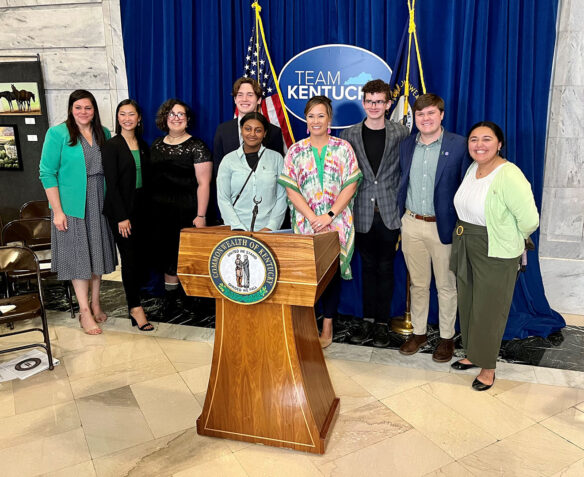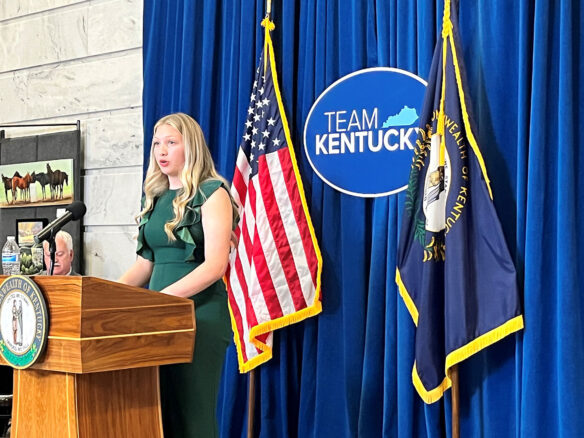
Students on the Kentucky Department of Education’s Commissioner’s Student Advisory Council spoke about their findings from the student-led mental health action summits at the Student Mental Health Awareness Event held on May 12 at the Kentucky State Capitol. Attending the event were, from left, Deputy Chief of Staff Heather Dearing, JuLeah Edie, Roxanne Lockard, Solyana Mesfin, Sam Smith, Lt. Gov. Jacqueline Coleman, Bentley White, Logan Justice and Soleila Elliot González. Photo by Audrie Lamb, May 12, 2022.
Students on the Kentucky Department of Education’s (KDE’s) Commissioner’s Student Advisory Council joined Lt. Gov. Jacqueline Coleman and Gov. Andy Beshear on May 12 at the Kentucky State Capitol for the ceremonial signing of House Bill (HB) 44, which allows local school districts’ attendance policies to include provisions for a student’s mental health or behavioral health status.
“We are seeing an example today about how this is going to be the most purpose-filled generation we have seen in a long time. One that understands how connected we are. One willing to be vulnerable for one another. One willing to lift up the people around us like we are seeing today,” said Beshear. “Team Kentucky is excited and proud to support these students and promote student mental health through multiple collaborations across agencies and with schools and community partners.”
HB 44 sponsors Rep. Lisa Willner and Rep. Bobby McCool were also in attendance.
“This certainly was a team effort,” said McCool. “These students have done a wonderful job. … Mental health is a health issue that we should address and continue to work on.”
Willner said that this will be the first piece of legislation that comes out of the student’s work on mental health advocacy, but certainly not the last.
“I cannot thank enough the students who came to us from across Kentucky who brought us this legislation for excused mental health absences,” she said. “This is my favorite kind of legislation. It’s bipartisan. It’s urban, rural. And it came directly from the folks most affected.”
The Student Mental Health Awareness Event also honored the work of Coleman and the students on student mental health awareness in Kentucky that began in June 2021.
Last year, Coleman partnered with the Commissioner’s Student Advisory Council (SAC), Kentucky’s regional education cooperatives, the Department for Behavioral Health at the Cabinet for Health and Family Services, and the Division of Family Resource Youth Service Centers to create the Student Mental Health Action Summits. The roundtable summits were formed to hear from students directly and collect data that could be used to better address students’ mental health.
There were 10 events held across the Commonwealth – nine in-person in many education cooperative districts and one virtual – with nearly 300 students in attendance overall. At each event, student facilitators framed the issue being discussed for students who were in attendance and presented basic student mental health data.
Members of the SAC analyzed every response to questions asked during the summits and came up with 10 recommendations to improve student mental health in Kentucky schools.

Charleigh Browning, a junior at Marion County High School, presented the findings from the student-led mental health action summits at the Student Mental Health Awareness Event held on May 12 at the Kentucky State Capitol. The students plan to present their findings to the Kentucky General Assembly’s Joint Interim Committee on Education this summer. Photo by Audrie Lamb, May 12, 2022
“While we are excited about House Bill 44, which allows mental health as an excused absence, we want to go further,” said Charleigh Browning, a junior at Marion County High School.
The recommendations are:
- Six excused mental health days per school year;
- Incorporating student voice into all levels of decision-making through tiered interventions and instructional methods;
- Allocating funding for a licensed mental health professional to be on school campuses at all times in every K-12 school;
- Peer mentoring for students who aren’t comfortable talking to an adult;
- Making suicide prevention materials and resources available in every classroom and administrative office, and implementing regularly updated suicide prevention curriculum at least twice a year;
- Requiring updated evidence-based and discussion-based mental health curriculum to foster a stigma-free environment;
- Using trauma-informed curriculum to be mindful and respectful when addressing the needs of students regarding eating disorders;
- Recognizing and respecting students’ preferred pronouns and using gender inclusive language in schools;
- Requiring schools and/or districts to provide student mental health check-ins that allow students to express their emotions and needs confidentially at least once a month; and
- Scheduling time throughout the day and year to account for mental health and give academic and transitional breaks.
“Our ultimate goal is for change to happen,” said JuLeah Edie, a senior at Rowan County High School.
The students plan to present their findings at the Kentucky General Assembly’s Interim Joint Committee on Education this summer.
“This is the beginning of many more wonderful pieces of bipartisan legislation that we look forward to working on in the future and we will always center our students and make sure that their voices are elevated,” said Coleman. “Whether it is through state and local boards of election, legislative or executive branches, advocacy groups or crafting guidance and policy language, we will bring this work to life because we have to in order to support every Kentucky student.”



Leave A Comment